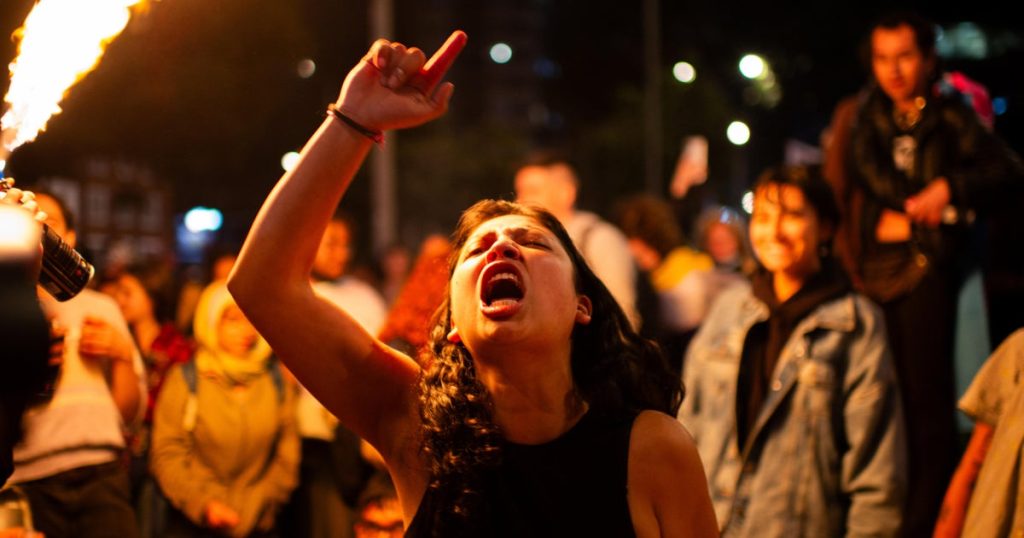Colombian authorities have apprehended a suspect in connection with the horrifying murder of a transgender woman, Sara Millerey, whose lifeless body was found in a creek, raising alarm and igniting protests across the nation. The 32-year-old succumbed to her injuries after being rescued from the water, with onlookers sharing disturbing footage of the incident online. This brutal hate crime, which occurred in Bello, near Medellín, has intensified fears within the transgender community and highlighted the ongoing violence faced by LGBTQ+ individuals in Colombia.
| Article Subheadings |
|---|
| 1) Circumstances of the Crime |
| 2) Community Reaction |
| 3) Official Response |
| 4) Broader Context of Violence |
| 5) Potential Legislative Changes |
Circumstances of the Crime
The grim details of Sara Millerey’s murder emerged after she was discovered in a creek in Bello, Antioquia department. Reports indicate that she had sustained severe injuries, including broken limbs, which suggested a violent confrontation. Firefighters who retrieved her from the waters attempted to revive her, but she later died in a hospital due to her injuries. Eyewitnesses recorded a video of the incident, which was widely circulated, further amplifying the shockwave this incident created within the community.
Community Reaction
The death of Sara Millerey has triggered an outpouring of grief and anger among activists and members of the transgender community in Colombia. Protests erupted following her death, with demonstrators holding candles and signs demanding justice and an end to the violence against transgender individuals. The community’s response has been fueled by a pervasive fear of such heinous acts becoming normalized. Sandra Borja, Millerey’s mother, highlighted the emotional gravity of the situation by sharing her last moments with her daughter, stating, “I knelt down and hugged her and told her that I loved her very much.” Her poignant farewell encapsulated the loss felt by many who knew Millerey.
Official Response
Following the incident, police within the region announced an arrest connected to Millerey’s murder. An initial suspect, identified as a gang member, has been taken into custody and faces severe charges, including torture and aggravated homicide. If convicted, he could face up to 70 years in prison. President Gustavo Petro condemned the brutal act, labeling those responsible as “ignorant people” attempting to “erase the differences” among individuals. The president’s statement underscored the urgent need for accountability and protective measures for vulnerable communities.
Broader Context of Violence
The tragic case of Sara Millerey is part of a worrying trend of violence targeting transgender and LGBTQ+ individuals in Colombia. The national ombudsman reported that 13 transgender women have been murdered in Colombia in 2025 alone. Organizations such as the Washington Office on Latin America and Caribe Afirmativo describe these figures as an undercount, indicating a greater prevalence of violence against LGBTQ+ communities—over 24 murders have reportedly occurred this year, directly linking to ongoing discrimination and hate crimes. The increase in such incidents has triggered alarms, especially in regions like Antioquia, where the number of hate crimes represents a significant portion of national statistics.
Potential Legislative Changes
In light of rising concerns regarding the safety and rights of transgender individuals, Colombian Congress is currently reviewing a bill aimed at bolstering protections for transgender citizens and enhancing penalties for hate crimes. These prospective legislative changes come as a response to the increasing violence against LGBTQ+ individuals and underscore the urgent need for a social dialogue regarding tolerance and acceptance in Colombia. Advocates argue that stricter laws could serve as both a deterrent to potential perpetrators and a vital tool in promoting awareness and support for the LGBTQ+ community.
| No. | Key Points |
|---|---|
| 1 | Sara Millerey, a 32-year-old transgender woman, was brutally murdered and discovered in a creek. |
| 2 | The crime has sparked widespread protests and mourning within the LGBTQ+ community in Colombia. |
| 3 | Authorities have arrested a gang member as the first suspect in the case, facing charges that may result in a lengthy prison sentence. |
| 4 | Reports indicate a worrisome trend of violence against transgender individuals, with multiple murders occurring this year alone. |
| 5 | Legislative efforts are underway to strengthen protections for transgender individuals and enhance penalties for hate crimes in Colombia. |
Summary
The tragic case of Sara Millerey not only highlights the rampant violence faced by the transgender community in Colombia but also galvanizes calls for action and change. With rising rates of hate crimes and violence, it is critical for authorities and citizens alike to engage in a dialogue about tolerance, rights, and the urgent need for protective measures for marginalized communities. As discussions regarding new legislation unfold, the hope remains that Sara’s heartbreaking story will lead to a societal shift toward acceptance and justice for LGBTQ+ individuals.
Frequently Asked Questions
Question: What happened to Sara Millerey?
Sara Millerey was a transgender woman who was brutally murdered and found in a creek in Bello, Antioquia. She sustained serious injuries that resulted in her death shortly after being rescued.
Question: What has been the community’s response to this crime?
The community has reacted with outrage and grief, organizing protests to demand justice for Millerey and to raise awareness about the violence faced by transgender individuals in Colombia.
Question: Are there legislative efforts underway in response to this violence?
Yes, Colombian Congress is discussing a bill aimed at strengthening protections for transgender individuals and increasing penalties for hate crimes, highlighting the need for legal reforms in addressing such violence.


